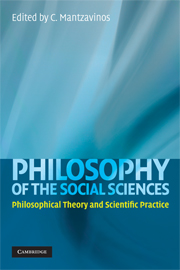Book contents
- Frontmatter
- Contents
- List of Contributors
- Acknowledgements
- Introduction
- Part I Basic Problems of Sociality
- 1 Language and Social Ontology
- Comment
- 2 Shared Agency
- Comment
- 3 The Reality of Group Agents
- Comment
- Part II Laws and Explanation in the Social Sciences
- Part III How Philosophy and the Social Sciences Can Enrich Each Other: Three Examples
- Epilogue
- Name Index
- Subject Index
- References
3 - The Reality of Group Agents
Published online by Cambridge University Press: 05 June 2012
- Frontmatter
- Contents
- List of Contributors
- Acknowledgements
- Introduction
- Part I Basic Problems of Sociality
- 1 Language and Social Ontology
- Comment
- 2 Shared Agency
- Comment
- 3 The Reality of Group Agents
- Comment
- Part II Laws and Explanation in the Social Sciences
- Part III How Philosophy and the Social Sciences Can Enrich Each Other: Three Examples
- Epilogue
- Name Index
- Subject Index
- References
Summary
Introduction
Human beings form many sorts of groups but only some of those groups are candidates for the name of agent. These are groups that operate in a manner that parallels the way that individual agents behave. They purport to endorse purposes, to form representations and to act for the satisfaction of those purposes according to those representations. And, building on those purported capacities, they make commitments and incur obligations, they rely on the commitments of others and claim rights against them. As candidates for group agents of this kind we might cite the partnership or the corporation, the church or the political party, the university or the state.
But are such entities truly agents? Or are they mere simulacra of agents? Do they replicate the agency of individual human beings? Or do they merely simulate it? That is the question I address in this chapter.
The chapter is in three sections. In the first section I set out the requirements that systems of any kind must fulfill if they are to count as agents. In the second I look at the way in which individuals might seek, on the basis of shared intention, to form a group agent. And then in the final section I show how the sort of entity they construct in that way can meet the requirements given and count as a genuine agent.
- Type
- Chapter
- Information
- Philosophy of the Social SciencesPhilosophical Theory and Scientific Practice, pp. 67 - 91Publisher: Cambridge University PressPrint publication year: 2009
References
- 37
- Cited by



